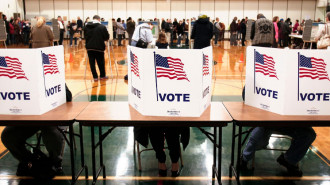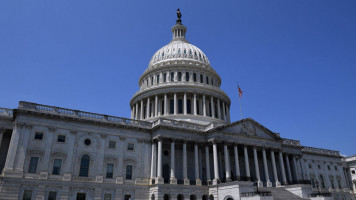Iran rejects accusations it supplied missiles to Yemen rebels for use against Riyadh
Iran rejects accusations it supplied missiles to Yemen rebels for use against Riyadh
Iran officials have been largely quiet about Riyadh's claims it provided missiles to Houthi rebels used in an attack on Riyadh Sunday night.
2 min read
Saudi Arabia claimed the missiles were Iranian-supplied [AFP]
Iran has rejected claims made by Saudi Arabia that it provided the missiles used in an attack on Riyadh Sunday night.
Brigadier General Yadollah Javani, from the Iranian Republican Guards, rejected claims made by Riyadh that Iran was arming the Houthi rebels, which a Saudi-led coalition has been engaged in a three-year war with.
"Everyone knows that all routes to send arms to Yemen are blocked and that Saudi Arabia has imposed a complete siege on the oppressed nation of Yemen," he told Tasnim News Agency.
He added that Saudi Arabia's claim that Tehran was involved in the attack were to "cover up its defeats in Yemen", the news agency reported, paraphrasing the officer.
Iran has long insisted that Yemen's Houthi rebels are able to construct their own rockets, like the ones that were aimed at Riyadh Sunday night.
Although rocket fire into southern Saudi Arabia is fairly common, missile attacks on the capital Riyadh - some 1,000km away - are rare.
Iran also rejected claims that it supplied a rocket launched at Riyadh's international airport last November, despite the UN appearing to back the Saudi allegations.
Seven missiles were launched from Yemen on Sunday evening with one of the rockets killing an Egyptian man in Riyadh.
Saudi Arabia's military threatened Tehran Monday saying, "[we] reserve the right to respond against Iran at the right time and right place".
Although there have been no other responses from senior Iranian officials and news agencies to Riyadh's claims, Parliament Speaker Hossein Amir Abdollahian attacked Saudi Arabia's intervention in Yemen - its third anniversary marked by Houthi supporters in Sanaa on Monday.
Brigadier General Yadollah Javani, from the Iranian Republican Guards, rejected claims made by Riyadh that Iran was arming the Houthi rebels, which a Saudi-led coalition has been engaged in a three-year war with.
"Everyone knows that all routes to send arms to Yemen are blocked and that Saudi Arabia has imposed a complete siege on the oppressed nation of Yemen," he told Tasnim News Agency.
He added that Saudi Arabia's claim that Tehran was involved in the attack were to "cover up its defeats in Yemen", the news agency reported, paraphrasing the officer.
Iran has long insisted that Yemen's Houthi rebels are able to construct their own rockets, like the ones that were aimed at Riyadh Sunday night.
Although rocket fire into southern Saudi Arabia is fairly common, missile attacks on the capital Riyadh - some 1,000km away - are rare.
Iran also rejected claims that it supplied a rocket launched at Riyadh's international airport last November, despite the UN appearing to back the Saudi allegations.
 |
"[We] reserve the right to respond against Iran at the right time and right place. |  |
Seven missiles were launched from Yemen on Sunday evening with one of the rockets killing an Egyptian man in Riyadh.
Saudi Arabia's military threatened Tehran Monday saying, "[we] reserve the right to respond against Iran at the right time and right place".
Although there have been no other responses from senior Iranian officials and news agencies to Riyadh's claims, Parliament Speaker Hossein Amir Abdollahian attacked Saudi Arabia's intervention in Yemen - its third anniversary marked by Houthi supporters in Sanaa on Monday.
"Exactly three years ago - at the beginning of the aggressions against Yemen - you told me in Jeddah that Saudi Arabia will destroy Ansarullah (the Houthis) in northern Yemen in less than three weeks. Today, the Yemeni resistance entered the fourth year of its resistance against occupation and your unwise intervention," Amir Abdollahian wrote on Twitter.
Yemen's war began in September 2014, when Houthi rebels and supporters of former President Ali Abdullah Saleh took over the capital, forcing the government south.
Saudi Arabia and its Arab allies intervened in the war in March 2015, with a devastating siege on the country and as many as 10,000 killed in fighting and bombing.

![Palestinians mourned the victims of an Israeli strike on Deir al-Balah [Getty]](/sites/default/files/styles/image_684x385/public/2024-11/GettyImages-2182362043.jpg?h=199d8c1f&itok=xSHZFbmc)


![The law could be enforced against teachers without prior notice [Getty]](/sites/default/files/styles/image_684x385/public/2178740715.jpeg?h=a5f2f23a&itok=hnqrCS4x)
 Follow the Middle East's top stories in English at The New Arab on Google News
Follow the Middle East's top stories in English at The New Arab on Google News


